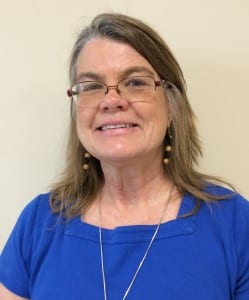Tina Jenkins, PT, OTR/L, is a physical and occupational therapist who joined the Vereen Center staff in 2015 after spending almost twenty years with the Phoebe-Worth Medical Center. As part of the Vereen Team, Tina will be working with both inpatient and outpatient cases for physical and occupational therapy.
Tina brings a wealth of experience to the Vereen Team. She earned her Bachelor of Science in Physical Therapy from the Medical University of South Carolina in 1982. Continuing her education at Belmont University, Tina earned her Master of Science in Occupational Therapy there in 2004. When asked what she enjoyed most about working in physical and occupational therapy, Tina replied: “The rehabilitation profession gives me an opportunity to let a little love shine through on a daily basis.” One of the current topics in rehabilitation that interests her most is helping individuals to age well and be healthy for life.
Originally from South Carolina, Tina is married to Butch Jenkins who is also a physical therapist. They have three children – Johnathan works in financial information systems, Savannah is pursuing a DPT in physical therapy at the University of St. Augustine (FL), and William Hunter is a freshman soccer player at the University of Charleston (WV). Tina and Butch reside in Sumner and enjoying farming, hiking, biking, and traveling in their free time together.
Tina Jenkins began working at the Vereen Center as a Physical and Occupation Therapist in 2015. Jenkins earned her Physical Therapy degree at the Medical University of South Carolina in 1982 and in 2004 she went back to her Occupational Therapy degree at Belmont University in Nashville, Tennessee. Jenkins had spent the majority of her career working at smaller hospitals in rural Southwest Georgia and decided she needed a change.
“I was lucky to be hired by Scott Romanowski at the Vereen Center, and to be able to provide Physical Therapy and Occupational Therapy care to the patients here at Colquitt Regional Medical Center has really been a blessing to me,” Jenkins said.
Jenkins’ interest in becoming a therapist was sparked by her interest in body movements.
“I just loved movement; I was a high school cheerleader, a majorette back in the day when they had majorettes, and I just loved something about moving,” she said. “I knew the wellness and benefits, even in high school, so I wanted to work at a medical center, but movement was my thing.”
Jenkins treats patients who have undergone a variety of medical procedures, especially knee, hip, and joint replacements; who experience a range of medical conditions, such as stroke and CDA; and who live with illnesses that limit their mobility, like diabetes, high blood pressure, congestive heart failure, and breathing problems. Jenkins stressed the importance of movement in the healing process, even for critical patients in Intensive Care.
“That is such a big part of wellness, getting back up on your feet and moving,” she said. “We have patients who are critical patients, and even for those, it is so important for range of motion and your bed mobility, anything to get the lungs working, the heart working, the joints flexible.”
Like many in the medical field, Jenkins’ patients inspire her on a daily basis.
“I’ll have a patient who maybe just had a total knee replacement – you know, they’ve been working, living with pain and disability for possibly years, have had trouble getting around, and the detrimental effects of that are maybe weight gain, they have blood pressure issues, diabetes, things like that,” she said. “They found the courage to do something about it. They inspire me, and if I can help in some small way to get them back up on their feet and get going, the day’s been well spent.”
Jenkins tries to focus on the positive with her patients and uses that as motivation and encouragement for them and herself.
“Maybe I can’t get them to run in a marathon today, but if we can get them out of that bed and sitting in a chair, that’s a win-win,” she said. “And that makes me feel good and enjoy my day. I get a chance to chat with patients and have conversations, and I try my best not just to talk about the negative: ‘Oh my goodness, you had a stroke’ or ‘You had a total knee (replacement), and you’re going to hurt. What are we going to do?’ I try to talk about, ‘Well, next month maybe you can go fishing,’ or ‘Next month, I know you have a trip with your grandkids planned.’ I try to be positive and help them look ahead to the future and just enjoy the moment.”
Jenkins believes that consistency throughout the treatment process is extremely beneficial to the patient, especially when it comes to quality of care.
“I try my best to earn the trust of my patients and build a better relationship by being consistent with their care,” she said. “We really try here at Colquitt Regional Medical Center to have the same therapists follow the patients along so that they’re not getting somebody new each time because it is so important that you don’t have to walk in and ask the same 100 questions that you asked the first time. You know me; you know what to do and how to get going.”
According to Jenkins, the ability to build those relationships with patients and other staff that allows for better, faster care is a result of the inclusive and cooperative atmosphere at the Vereen Center.
“I think the Vereen Center at Colquitt Regional Medical Center is unique because it has a big time heart, a big time soul, a big time brain, but it is still a small town and community,” she said. “You know people; it’s not difficult to get things done. I worked in other settings where getting things done was almost impossible because you had to go through this chain of command that took forever, so that’s one thing that’s unique about here. And you don’t lose any expertise; you don’t lose any quality of care. As a matter of fact, I think it’s better.”
Jenkins’ interest in movement and belief in its ability to help the healing process still guides her.
“If I had one health tip to give to people, it would be to move,” she said. “You don’t have to run a marathon; you don’t have to run a half marathon, especially as we get a little older. Take the steps [instead of the elevator]. If you’re home and don’t have a job that you go to, walk around your yard. Get up and move. Do not let that be the day that you can’t move anymore. Every day do what you can to get up and move.”
Outside of work, Jenkins like to travel and spend time outdoors, especially with her husband and (when she can) her three children: a 26-year-old who works at SunTrust Downtown Atlanta, 24-year-old who just earned her doctorate in Physical Therapy in St. Augustine, and her youngest son who is still at the University of Georgia with aspirations of attending medical school.



